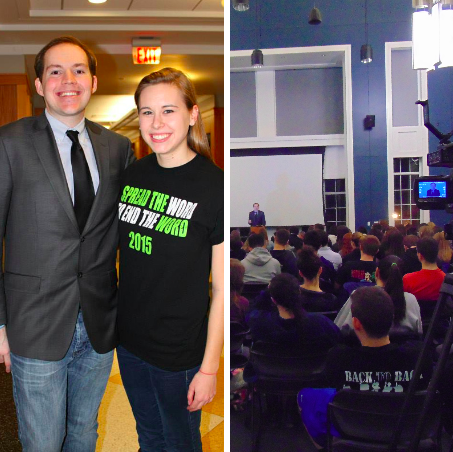Last week, I spoke in front of more than 150 students at The College of New Jersey for their “Spread the Word to End the Word” week, a national campaign in which people pledge to stop using the word “retarded” in a derogatory manner.
In the hopes of spreading awareness for the campaign, I wanted to share my personal story for The Mighty community that I shared with the students.
In 1996, I started third grade in a multi-handicapped classroom with kids aged 6 to 14 with different types of learning disabilities. Here, I was introduced to the word “retarded” for the first time. I didn’t know what it meant at the time, but because my classmates and I were separated from everyone else, we were quickly labeled as the “speds,” “the outsiders” and the “retarded classroom.”
It was also then that I learned the word “bullying.” The word “retard” had made a hurtful impact on my life. When I was 4, I was diagnosed with autism. Because of my inability to communicate with people by age 5, I was be evaluated to see if I also had an emotional disorder. I lashed out so much as a kid because I wanted people around me to understand me when the words weren’t there.
When kids started calling me “retarded,” I didn’t have much hope that things would ever get better for me. I battled to get through school and my therapies. All I wanted was to be accepted for who I was.
My classmates were enduring similar experiences, but because I couldn’t communicate, because I couldn’t talk things through, I was still the odd kid out. I was desperately trying to make my first friend in a world that was telling me being different from others was wrong.
I wouldn’t make my first friend until high school when I was in a different school for individuals with special needs. The bullying had stopped, and I was given a chance after years of speech therapy to finally have conversations with my peers. Around then, I actually started using the word “retarded” to try and fit in with the wrong crowds in school. I think one of the biggest challenges about having autism is mind blindness and not being able to understand how others are feeling sometimes. After a year of hurting others and not realizing the damage I was doing, I realized I was doing just what had been done to me. For the first time, I wanted to help students like me.
After several years of focusing on disability-related issues, I decided to become an autism and disability advocate in my first year of college. I saw a need to break the barriers of intolerance separating the students with special needs from everyone else on my campus.
Then in 2009, the “Spread the Word to End the Word” campaign started. It revolutionized and spread awareness for anti-bullying campaigns across the world. When it was first announced, Special Olympics came out with the following statement:
The motivation for the campaign was driven by a united passion to promote the positive contributions people with intellectual disabilities make to communities around the world combined with a simple call to action — a pledge to stop using a word — that also symbolizes positive attitude change and a commitment to make the world a more accepting place for all people.
Six years later, hundreds of thousands of people take the pledge to stop using the r-word in a derogatory fashion every year. What started off as a local campaign has become a national phenomenon helping countless individuals each day.
Dr. Temple Grandin, one of the most well-known disability advocates we have in our community today, says it best today when she tells the world to look at those with disabilities as “different, not less.”
Whether it’s attention deficit disorder, nonverbal autism, Alzheimer’s, a traumatic brain injury, dyslexia, Down syndrome or anything else, each individual in our society has something to offer.
Regardless of the disability, each one of us has amazing abilities that deserve to shine.
Many who are involved with this campaign tell us to stop saying the word “retarded” and replace it with the word “respect.” I would like to go a step further and ask you to also consider the word “reflection.” Look at who you are as a person and how you treat others. Try to define yourself as someone you can be proud of when you look back decades from now.
So at the end of the day, I ask you this:
Be educated, learn the facts, and please define yourself as someone who will try and be understanding of others. Society will be a whole lot better for it.
I’d like to thank –> for having me out to speak to help spread the word about an important cause that affects so many!
This post originally appeared on KerryMagro.com.
Want to end the stigma around disability? Like us on Facebook.
And sign up for what we hope will be your favorite thing to read at night.

